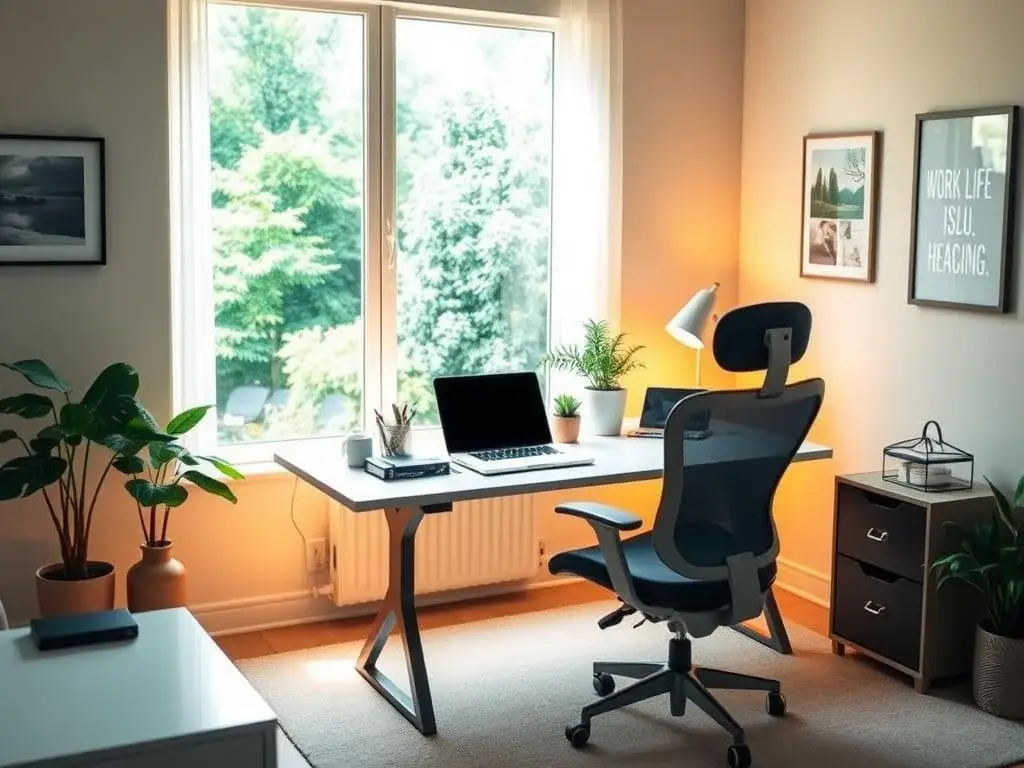Finding a balance between work and personal life is key in today’s fast world. It’s important to understand what work life balance means. This balance helps you feel better and work more efficiently.

Technology makes it easy to work too much. But, it’s vital to set limits and take care of yourself. Using work life balance tips can help you manage your time better, feel less stressed, and be more productive.
Table of Contents
Introduction to Work-Life Balance
By focusing on work life balance, you can live a better life. You’ll feel and be healthier. In this article, we’ll share 10 tips to help you find balance and improve your well-being.
Key Takeaways
- Understanding the work life balance meaning is essential to achieving a balance between work and personal life
- Implementing work life balance tips can help you manage your time more efficiently
- Prioritizing self-care is essential to reducing stress and boosting productivity
- Setting boundaries between work and personal life is crucial to achieving a better work-life balance
- Technology can be both a help and a hindrance to achieving a work-life balance
Understanding Work-Life Balance in Today’s Digital Age
As you balance your career and personal life, knowing about work-life balance is key. Today, being always connected can mix up work and personal time. This can lead to burnout and less productivity.
To find a healthy balance, see how technology affects your life. Technology can be both a blessing and a curse. It helps you stay in touch but also makes you feel like you must always be available. Setting limits and taking care of yourself is important.
Here are some ways to get a better balance:
- Set clear lines between work and personal time
- Make time for self-care and personal activities
- Use technology to help, not control your life
Understanding work-life balance and working towards it can boost your well-being and productivity. Remember, finding a good balance is an ongoing effort. But the rewards are worth it.
Why Maintaining Work-Life Balance Matters for Your Career
Keeping a good importance of work life balance is key for your career and health. It helps you manage time well, care for yourself, and set limits. This way, you work better, are more productive, and feel good about your job.
Having a balance also means you’re happier at work, stay longer, and feel healthier. It’s all about finding the right mix for you.
Some big pluses of a good work-life balance are:
- Increased productivity and efficiency
- Improved job satisfaction and reduced turnover rates
- Better overall health and well-being
- More time for personal interests and hobbies
- Improved relationships with family and friends
By focusing on importance of work life balance, you reach your career goals, strengthen relationships, and feel fulfilled. Remember, what works for others might not for you. Try different approaches to find what suits you best.
Essential Work Life Balance Tips for Professional Success
Understanding the work life balance meaning is key to your well-being. Good work life balance tips help keep your personal and work life in check. Start by setting clear boundaries and having a dedicated workspace.
A dedicated workspace is a top work life balance tip. Make a specific area for work, whether at home or in the office. Keep it tidy to stay focused and productive.
- Clear communication with work and family
- Setting realistic goals and priorities
- Saying “no” to non-essential tasks
Using these work life balance tips daily can lower stress and boost your well-being. You’ll find a better balance between work and personal life.
Time Management Strategies for Better Balance
Learning to balance work and life is key to a better life. Good time management helps reduce stress and boosts productivity. By focusing on what’s important, setting achievable goals, and avoiding delay, you can find balance.
The Pomodoro Technique is a great way to manage time. It involves working in 25-minute blocks, then taking a five-minute break. This method keeps you focused and prevents burnout. Saying no to things you don’t need to do and delegating tasks also helps control your schedule.
Here are some tips for managing your time well:
- Set clear goals and priorities
- Use a calendar or planner to stay organized
- Avoid multitasking and minimize distractions
- Take regular breaks to reduce stress and increase productivity
By using these time management tips, you can find a better balance between work and personal life. This reduces stress and improves your overall well-being. Remember, finding this balance takes time and effort, but it’s worth it.
Creating Effective Morning and Evening Routines
Having a balance in your life is key for a work life balance definition. This balance comes from good morning and evening routines. A morning routine helps you start the day right, focusing on what’s important. An evening routine, on the other hand, helps you relax and get ready for sleep, showing the importance of work life balance for your health.
When making your daily routines, think about these:
- Setting clear goals and priorities
- Creating a schedule for work, rest, and fun
- Using stress-reducing activities like meditation
Designing Your Ideal Morning Ritual
Your morning can be made to fit what you like and need. It might include exercise, reading, or just enjoying coffee. Starting your day with calm and purpose helps you face challenges better.
Evening Winddown Practices
Evenings are for unwinding from the day’s stress. Try yoga, listening to calm music, or spending time with family. By focusing on relaxation, you recharge for tomorrow, improving your work life balance definition and understanding its importance.
Setting Healthy Boundaries with Technology
To get a better work life balance, setting healthy tech boundaries is key. This means limiting your screen time and not doing work during personal hours. Also, make tech-free zones in your home. These steps help avoid burnout, boost relationships, and keep you in control.
Effective tips include having device-free times, like during meals or before bed. Make a tech-free area in your home, like the bedroom or dining room. Also, have a “no work talk” rule during personal time to fully disconnect from work.
These boundaries help you stay focused and productive. Remember, finding the right balance is about what works for you. With practice and patience, you can set healthy tech boundaries and enhance your well-being.
Other tips for better work life balance include:
- Setting clear boundaries with your employer and colleagues
- Establishing a routine for checking work emails and messages
- Creating a technology-free morning routine to start your day positively
Prioritizing Self-Care and Personal Time
Striving for a better importance of work life balance means focusing on self-care and personal time. It’s about making choices on how you use your time and energy. This helps reduce stress, boosts your health, and keeps you feeling fulfilled.
Learning how to balance work and life is key for your happiness. To find this balance, try these activities:
Physical Wellness Activities
Doing physical activities like exercise or sports can be calming. Try walking, jogging, yoga, or any sport you love.
Mental Health Practices
Mental health practices, like meditation or mindfulness, can ease stress and sharpen your focus. Activities like deep breathing, journaling, or talking to friends and family can help.
Hobby Integration
Adding hobbies to your daily life keeps you energized and motivated. Enjoy reading, painting, or playing music. By focusing on self-care and personal time, you’ll find a better importance of work life balance and a happier life.
Maximizing Productivity During Work Hours
To get a better work life balance, focus on being productive at work. This means setting priorities, avoiding distractions, and taking breaks. Stay focused and don’t try to do too many things at once. This way, you’ll finish tasks faster, feel less stressed, and keep control over your work.
Here are some tips to boost your productivity:
- Prioritize your tasks based on importance and deadlines
- Use time-management tools to stay organized and on track
- Take regular breaks to stretch, move around, and rest your eyes
- Minimize digital distractions, such as social media and email notifications
- Stay hydrated and energized with healthy snacks and drinks
By following these tips, you’ll work better, feel less stressed, and find a better balance between work and life. Don’t forget to take breaks and take care of yourself to stay healthy.

Being productive at work lets you enjoy your free time more. You can dive into hobbies, spend time with loved ones, and live a more fulfilling life. This balance is key to thriving in every part of your life.
Building Support Systems at Work and Home
Creating a strong support system is key for a healthy work life balance. Having a network of colleagues, family, and friends helps share duties, lowers stress, and keeps you in control. The value of work life balance is huge, affecting your happiness and job satisfaction.
At work, effective communication with colleagues is vital. Be open, clear, and respectful. This builds a supportive work environment where everyone can help each other.
At home, a strong family support is crucial. Set clear boundaries and enjoy activities that relax you. Ways to build family support include:
- Regular family meetings to discuss goals and challenges
- Sharing household responsibilities to reduce stress and workload
- Encouraging open communication and emotional support
Also, having a professional network is important. Attend events, join groups, and connect online. A strong support system at work and home helps you manage life’s challenges. It leads to success and happiness in both your personal and professional life.
Flexible Working Arrangements and Their Benefits
Flexible working arrangements can change the game when balancing work and life. They give you control over your schedule. This lets you focus on self-care, cut down on commuting, and boost your productivity.
These arrangements can include working from home, flexible hours, or compressed workweeks. They’re designed to fit each person’s needs. For example, a working parent might care for their kids during the day and work from home at night. Someone with a long commute might work remotely to save time.
Here are some benefits of flexible working arrangements:
- Improved work-life balance
- Increased productivity
- Reduced stress
- Enhanced job satisfaction
- Better health and well-being
Flexible working arrangements benefit both employees and employers. They offer more autonomy and flexibility. This can attract and keep the best talent, boost job satisfaction, and increase productivity.
As you think about balancing work and life, consider flexible working arrangements. They can help you reach your goals and improve your well-being.
Stress Management Techniques for Professionals
Managing stress is key to a healthy work-life balance. It helps prevent burnout, improves relationships, and keeps you in control. The value of balancing work and life is huge, affecting your well-being and productivity.
Here are some tips to manage stress:
- Practice mindfulness: Take a few minutes each day to focus on your breath and calm your mind.
- Engage in stress-relief exercises: Regular exercise can help reduce stress and anxiety.
- Use time-blocking methods: Schedule your tasks and prioritize your time to minimize stress and maximize productivity.
By adding these stress management techniques to your daily routine, you can boost your well-being. Remember, taking care of your mental and physical health is vital for a healthy, productive life.
Follow these tips and put your well-being first. This way, you can lower stress and achieve a better work-life balance. It leads to a more fulfilling and productive life.
The Role of Exercise in Maintaining Balance
Regular exercise is key to a healthy work life balance definition. It helps lower stress and boosts well-being. Adding physical activity to your day can lift your mood, up your energy, and prevent burnout.
There are many ways to exercise, like walking, jogging, cycling, or yoga. The most important thing is to pick something you like and can fit into your life. Even a little bit of exercise can greatly improve your health and work life balance definition.

- Improved mental health and reduced stress
- Increased energy levels and productivity
- Enhanced overall physical health and well-being
By making exercise a daily habit, you’re on your way to a better work life balance definition. It’s a big step towards a higher quality of life.
Nutrition and Sleep Habits for Optimal Performance
When it comes to how to balance work and life, nutrition and sleep are key. A balanced diet and enough sleep boost energy, focus, and health. By focusing on these, you can better manage your importance of work life balance and work more efficiently.
For busy professionals, meal planning can be tough. Here are some tips to make it easier:
- Plan your meals in advance
- Shop for healthy ingredients
- Prepare meals in bulk
Sleep hygiene is also vital for top performance. This means setting a regular sleep schedule, having a calming bedtime routine, and avoiding caffeine and screens before bed.
By focusing on nutrition and sleep, you can keep a healthy work life balance and feel better overall. Remember, taking care of your body and mind is key to success in both your personal and work life.
Dealing with Work-Life Balance Challenges
Handling work-life balance issues needs a proactive mindset. Using good work life balance tips can really help. You must spot challenges, plan how to beat them, and ask for help when you need it. This way, you can lower stress, better your relationships, and keep control and freedom.
Some great tips for work life balance include focusing on important tasks, setting clear limits, and making a schedule for personal time. Technology can also be a big help. Use reminders, time-tracking tools, and automate tasks you do over and over. Also, taking breaks and taking care of yourself keeps you motivated and sharp.
Here are some work life balance tips to think about:
- Set clear boundaries between work and personal life
- Prioritize tasks and focus on high-priority activities
- Use technology to automate repetitive tasks and set reminders
- Take breaks and practice self-care
- Seek support from colleagues, family, and friends when needed
By using these work life balance tips, you can cut down stress, enhance your relationships, and keep a sense of control and freedom. Always be proactive, adaptable, and open to new things. And don’t hesitate to ask for help when you need it.
Maintaining Long-Term Balance Through Life Changes
Life’s ups and downs can make it hard to keep a good work life balance. But, it’s key for your health and happiness. It helps you feel less stressed, improves your health, and keeps you feeling fulfilled.
To keep this balance, focus on your relationships and stay organized. Also, don’t hesitate to ask for help when you need it. This way, you’ll stay energized and motivated, even when things get tough.
- Prioritizing self-care and making time for activities that bring you joy and relaxation
- Setting clear boundaries between your work and personal life
- Seeking support from friends, family, or a professional counselor when needed
By using these tips, you’ll be ready to face life’s challenges. Remember, finding long-term balance is a journey. Be patient, flexible, and kind to yourself as you go through life’s ups and downs.
Conclusion: Creating Your Sustainable Work-Life Balance Strategy
Achieving a sustainable work life balance needs a mix of steps. Start with self-care: exercise, eat well, and sleep enough. Set clear lines between work and personal life. Also, manage digital distractions well.
Get support from family, friends, and colleagues. This helps keep balance and lowers stress.
Creating a work life balance strategy keeps you motivated and focused. Try different time management methods, like time-blocking. Find what works for you.
Remember, balance is a journey. Be patient and flexible as your life changes.
FAQ
What is the meaning of work-life balance?
Work-life balance means finding the right mix between work and personal life. It’s about balancing your career goals with your health, happiness, and family time.
Why is work-life balance important?
A good work-life balance is key to feeling less stressed and more productive. It helps you manage your time well and take care of yourself. This way, you stay happy and fulfilled.
How can I balance work and life?
To find balance, set clear work hours and have a dedicated space for work. Avoid digital distractions and manage your time wisely. Also, make time for activities that nourish your mind and body.
What are the benefits of work-life balance?
Work-life balance brings many benefits. It reduces stress and boosts job happiness. It also improves your health, relationships, and productivity.
What are some tips for achieving work-life balance?
To achieve balance, set clear boundaries and have a dedicated work space. Manage digital distractions and use time wisely. Don’t forget to take care of yourself and enjoy life’s moments.
